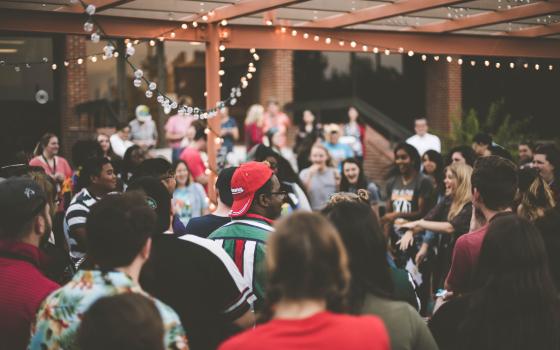This time last year, I found myself standing in the empty living room of the tiny three-bedroom house I would soon call home. Devoid of any furnishings except a few discarded boxes of junk previous tenants left in the basement, the house was a blank slate, the first step in a new mission another sister and I had been tasked with undertaking. The larger task at hand was to open a neighborhood center in Camden, New Jersey, but in that moment, finding furniture to fill our local community seemed like as much as we could handle.
In the days and weeks ahead, we would scavenge closing convents and generous donors' homes for spare pieces of furniture to make our house a home. Within a few months, the living room I had stood in in the stifling summer heat thinking it might fit a small couch and possibly a chair was filled with the hustle and bustle of our first open house.
Everyone who came had a part to play in the community taking shape. One sister marveled at the way the rugs from a dear friend's old cabin miraculously matched everything else, while a former colleague smiled when he saw that the oak chest his father had built now acted as our coat closet. Our next-door neighbor, an older woman from Greece, marveled at the inside of the house, which in her 30 years in the neighborhood she said she'd never seen so clean.
From near and far, people gathered to celebrate this new beginning, not just for my local community or the neighborhood center, but for all of us: a community bound by much more than furnishings and well-wishes, a community bound by connection and rooted in communion.
As the sisters, friends and neighbors departed that night, the same sentiment was repeated time and again: "It was so good to be together, so very nice to celebrate like we used to!"
Celebration, it seemed, by and large had become a thing of the past. The implication was that we used to do this, but somewhere along the line, life butted in, and celebration, the joy of being together for the sole purpose of shared enjoyment, seemed to have slipped from our grasp. Sure, there were big community events like chapters and assemblies, milestones like jubilees, and generational gatherings and reunions, but these were exceptions rather than the norm.
As our living room emptied out that evening, there seemed to be a larger void that needed to be filled. The power of communion, after all, lies in the ability to gather people together in love. That requires intention and attention. We must be intentional in making a point of coming together, giving special attention to the purpose of our gathering and the aim of inclusion. This allows us to create space for relationship, space where we can come to know the other, celebrate one another and learn, with joy and humility, that there is always room for growth and development in our relationships, to discover newness in our midst.
Over the coming months, we began welcoming more people into our home and our new venture in communion. First, there were sisters living near us whom we wanted to get to know better. Then there was the community of neighbors in Camden with whom we began to develop relationships as we ministered with and among them. And then there were the neighbors we encountered each and every day in our local parish and beyond.
In each of these settings, communion looked different. Yet the call remained the same: to celebrate what drew us together and the gift relationship brings as we develop and/or renew relationships over time.
Together, we found cause for celebration. Sharing simple meals and finding space for prayer and fellowship across denominational, racial, socioeconomic and ethnic lines helped us celebrate the gift of being together and being one, despite our differences — or, perhaps, in the light of embracing our difference. We learned more about those we thought we knew, and in sharing new experiences, we garnered the power of communion and all the hope and joy it brings with it.
This idea of the power of communion is nothing new. Even as I write this, I've thought to myself that things like celebration and communion aren't serious enough to warrant putting pen to paper. It's easy to think that. With all that is wrong in the world, with sexual abuse and misconduct, with racism and gun violence, with natural disasters and civil discord, what difference do a few open houses and a little mission have to make in the world?
The temptation is to write off goodness and grace in the face of disfunction and discord. That, though, is when the power of communion, the presence of love, and the critical work of celebration are most needed. Truth, no matter how simple it seems, shines brightest in the darkness. Holding space for communion and celebration then becomes essential because it is in the space of those two things that hope flourishes and love holds firm.
It is the persistent and faithful flourishing of hope that causes us to say, not out of manners or perfunctory habit, but out of genuine desire and intention, "We must do this again!" We know in those moments we are better because we have been together. We know we call out the best in one another and, as a result, we long to revive and stoke the fires of hope we spark within each other's being when we're together. These then become the moments that shine through in the lives we live even when we are apart.
Just as our little house had overflowed with love after that first open house, communion has continued to take shape through grace-filled crafting over the last year. When the work of bringing the Gospel call to life is tedious and trying, bearing few concrete products, it is the relational results of ministry that inspire hope.
Standing in our local parish a week ago as I renewed my temporary vows, I could feel the support of that community standing behind me. Gathered together on a dreary Saturday morning, there were the people of the parish with whom we celebrate daily Mass, my family and friends, my religious sisters, and the members of the Lutheran parish who come to our weekly neighborhood prayer at the center. Feeling their presence and support, I marveled at the mysterious work of communion God enacts in our lives through a wholehearted response of love. My vows are clearly to God, yet these vows tie me inextricably to my neighbor. This is the power of communion, a call to be one with God and neighbor without distinction. In that call, we grow together in faith and commitment, celebrating the gifts God gives us and declaring with great joy and gratitude each new day, "We must do this again!"
[Colleen Gibson is a Sister of St. Joseph of Philadelphia. Author of the blog Wandering in Wonder, she currently serves as coordinator of services at the SSJ Neighborhood Center in Camden, New Jersey.]

